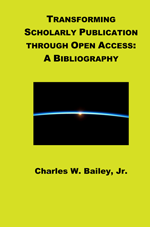The International Publishers Association has released Innovation in E-book Lending.
Here's an excerpt:
This special report assesses recent developments in e-lending, both in the trade and the academic sector, studying innovative approaches from the US, France, Sweden and Brazil. What these different projects have in common is that they are based on licenses which provide libraries with the conditions to acquire and lending e-books while putting publishers in control of lending terms. This allows publishers not just to protect their revenue streams, but to expand them.
Digital Scholarship | "A Quarter-Century as an Open Access Publisher"

